- Home
- Jane Peart
Senator's Bride Page 6
Senator's Bride Read online
Page 6
But she was glad they were going to keep their promise to each other a secret for a while longer. In this family, any decision brought a myriad of unsolicited opinions and advice. She was particularly apprehensive of the objections her famous father or her formidable Grandmother Devlin might put up if she told them now. She could just imagine their arguments. Frank was too old for her. His law practice was not yet solid enough to ensure a secure future for her.
But if he were to become a state senator—now that would make all the difference. She relished the satisfaction she would gain in making that announcement. The only thing that really mattered was that Frank loved her. However long she had to wait for all her dreams to be realized to their fullest—home, husband, children, even the delayed family reunion—Lynette was willing. Frank was well worth the wait.
Part III
New York City
September 1925
chapter
7
CRYSTAL KIRK was finally ready to leave. Everything had been done. Car packed, telephone service and electricity turned off, milk and newspaper delivery temporarily discontinued, instructions left with the landlady for mail to be held.
With the long trip to Mayfield, Virginia, ahead of her, she was hoping to get an early start and avoid the heavy morning traffic. She slipped on a cinnamon suede jacket over her beige sweater and skirt and picked up her overnight bag. In the hall she stopped in front of the mirror to pull on a brown felt cloche. Suddenly she leaned forward to inspect her reflection more closely. One hand moved up uncertainly to touch her hair. Had she made a horrible mistake?
Frowning, she confronted the result of the impulsive decision to cut her waist-length hair. It had seemed a good idea at the time. Short hair would be so much easier to manage while traveling, the operator at the beauty salon had persuaded her. Why not a Dutch-bob recently made popular by the screen star, Colleen Moore?
Crystal studied herself critically. Was it really all that becoming on her? Unlike the glamorous brunette actress, her hair was the color of sun-ripened wheat. She had hazel eyes, a nose she had always considered too short, and a mouth that was a little too wide. This new hairstyle made her look even younger than her twenty-eight years. In fact, she looked more like Buster Brown than Colleen Moore. How had she allowed herself to be talked into such a foolish thing?
Well, it was too late to do anything about it. What did it matter, anyway? She didn't know anyone in Mayfield except the Dabneys. Besides, this was to be a period of intense work, not a holiday.
She jammed on her hat and turned away from the mirror to take a last look around her New York apartment. Unexpectedly, she felt a strange reluctance to leave. With her hand on the doorknob, she paused. Why this puzzling feeling? Had she forgotten something? Left something undone?
For months she had been planning this trip. She had received a generous advance from a prestigious travel magazine for a photography project. The assignment was a real feather in her cap as a professional photographer. Why now did she feel this hesitancy?
These four rooms had been home for the past five years. She had come here soon after Sandy's death. Her war correspondent husband had been killed just before the Armistice in 1918, leaving her a widow at twenty-two. Her gaze swept the living room, its windows overlooking Washington Square and the park, the white plastered walls hung with some of her own photographs—the New England landscapes for which she was becoming known, tastefully framed. The spare modern interior with its clean-lined furnishings suited the pared-down life she had been living, a life some might call monastic.
Partly to survive, partly to fulfill her own ambitions, Crystal had concentrated on perfecting her craft. She had worked hard, struggling to attain recognition in a field where there were still relatively few women. Focusing on her career had cut down on her social life. But since she had no plans to remarry, she had no qualms about turning down invitations to parties or dinner dates with eligible men. During the last two years, she had gradually begun to reap some success in her chosen career. Her photographs had won several awards, and a gallery was interested in sponsoring an exhibit.
Coincidentally, the idea for this project that she had sold to Vagabond had its inception years before when visiting her college roommate, Sue Dabney, in Virginia. On that visit she had noticed many impressive antebellum mansions that were falling apart due to abandonment and neglect.
"Most of these families date back to the War Between the States," Sue's mother had told her. "And of course nobody can maintain those huge old homes anymore. Why, some of those households required twenty house servants to keep them up. Honey! Who can afford that kind of help nowadays?"
Driving along the back roads around Mayfield, Crystal had been dismayed to see that many of the mansions were fast becoming architectural derelicts. Her artistic interest was spurred, her sensibilities aroused to think that every vestige of these plantations, once small worlds unto themselves, was rapidly vanishing. Soon there would be no trace of them, no evidence that they had ever existed, and with them a whole lifestyle—a gender, more leisurely era—would pass from the American scene. Something should be done to save them, Crystal decided.
Now, she thought with satisfaction, something is going to be done, and I'm going to do it! Her idea—a picture-story on antebellum mansions in the South—had been accepted by Vagabond magazine. On imperishable film she would capture lasting portraits of these stately homes before they disappeared forever.
So why was she standing here, paralyzed with indecision? Her small station wagon was parked at the curb outside the apartment building. All she had to do was walk outside and be on her way.
Yet an unsettling premonition gripped her. She felt almost as if she were saying good-bye, as if this were the end of something. What nonsense! She would only be gone for a month, six weeks at the most.
Quickly she gathered up her camera bag and portable tripod, then taking a final look around, she pressed the deadbolt, went out, and closed and locked the door behind her.
Crystal drove slowly up the long, winding drive. Directly ahead stood a stately Georgian mansion, perfectly maintained, set like a jewel on a sweep of velvety green lawn. Coming to a stop in front, she gazed up at it in awe. This was certainly not one of the "sad old ladies" she had come to photograph. This must be exactly how it had looked when handsome carriages arrived here in colonial days, bringing elegantly dressed guests to balls and celebrations.
So complete was the illusion that Crystal would not have been surprised if the rapping of the polished brass knocker had summoned a white-wigged, liveried butler. Instead, the door was opened by a thoroughly modern young woman of about her own age, casually dressed in a kelly-green sweater and plaid skirt. Her rich copper-colored hair was bobbed, her brown eyes warm.
"Mrs. Cameron?" Crystal asked.
The young woman smiled. "No, I'm her daughter, Kitty Traherne."
The name registered immediately. This was Sue's friend, the one who had married a war veteran and was recently widowed. It was her small house the Dabneys had suggested that Crystal might be able to rent during her stay. They had understood that it had stood empty since her husband's death more than a year ago.
"Oh, well, let me introduce myself. I'm Crystal Kirk. I'm a houseguest of the Dabneys and . . ."
"Yes, of course, Sue phoned about you. Won't you come in?"
"Forgive me for intruding on you at a busy time," Crystal said, following the woman through a magnificent hallway and into a parlor. "Susan tells me you're leaving for Europe in a few days."
"It's quite all right, and yes, I'm going to France to visit my sister there."
They settled in two comfortable chairs flanking a marble fireplace, and Crystal got right to the point. "Well, I'm sure you have a great deal to do, so I'll be brief. You see, I'm a photographer, and I'm looking for a place to stay while I'm on assignment. Sue said you might consider renting yours."
"How long do you plan to stay in Mayfield, Miss Kirk?"
"It's Mrs. Kirk. I'm a widow," Crystal corrected quietly and saw a flash of sympathy in the other woman's eyes. "I expect to be here a month or six weeks. It really depends on how my search for subjects goes. If's been quite a while since I've been in this area, and I'm not sure if what I'm planning to photograph still exists. My idea is to capture on film some of the beautiful old plantation houses before it's too late . . . so many are disappearing. . . ."
Kitty nodded. "I know what you mean. Isn't it a shame? Some of them are falling to pieces, with the original owners long gone and no one else able to buy them or to maintain them without a large staff of servants."
"Not this one, though," Crystal said, glancing about the room with undisguised appreciation. "This house is wonderful!"
"Yes. Fortunately, except for a few years right after the War Between the States, it has been kept up. It is one of the few homes that has remained in the same family since it was built." She paused. "Well, it sounds as if you have an interesting few weeks planned, Mrs. Kirk. And yes, I was hoping to rent the cottage while I'm away. It would be nice to have someone in it. Would you like to see it now?"
"Oh, yes, I would!"
"Then I'll get the keys and we can walk over there. Eden Cottage is just through the woods."
She disappeared and Crystal took a moment to assess her surroundings—the creamy paneling, the polished mahogany Chippendale tables, the ornate frame displaying what must be a family portrait of earlier days hanging over the fireplace. Soon Kitty was back, a ring of keys rattling in her hand. "Come along. It's such a lovely afternoon, it will be a nice walk."
As they started down the drive, a handsome Irish setter bounded from the side of the house, his plume of a tail wagging.
"This is Tamish, my dog," Mrs. Traherne explained, bending to stroke his glossy russet coat. "He'll lead the way. He knows it well. My husband and I lived there for nearly five years, up until a few months before his death."
As they passed a well-tended garden, a tall, auburn-haired woman in a gardening smock waved a gloved hand. Returning the wave, Kitty explained, "My mother, Blythe Cameron. You'll meet her later."
They walked on in silence, then turned off a worn path leading into the woods. Tarnish, like a red streak, preceded them.
"He thinks he's going home." Kitty smiled. "He was devoted to Richard, keeps thinking he'll be back. . . . " Her words ended in a long sigh, and Crystal felt her pain. Even though Sandy had been dead nearly seven years, there were still moments when she missed him terribly.
As they came upon a clearing in the woods, Mrs. Traherne pointed. "There it is. Eden Cottage."
In the distance Crystal could see a dusty-pink-brick-and-white-clapboard cottage nestled under towering trees, a flagstone path zigzagging up to the porch. The dog dashed ahead, circling the house and sniffing the corners.
"He still thinks we live here," Kitty said. "I guess he's looking for Richard." She whistled for Tarnish, and he came panting up to her. Putting both hands under his muzzle, she looked down into those pleading eyes and said quietly, "Take your place, Tarnish, and stay"
The dog turned and trotted obediently to a spot near the gate. Then with a sigh that was almost human, he flopped down and put his head between his paws.
To lighten the poignancy of the moment, Crystal gestured toward the house. "It looks charming."
"Wait until you see it inside. You'll be better able to tell if it's what you want. A few years ago I had the place rewired and installed a modern kitchen and bathroom. But until we moved in, the house had remained the same as when the last bride of Montclair lived here."
"Bride of Montclair?"
Kitty smiled. "Montclair is the Montrose family's home about half a mile through the woods from here. Eden Cottage was originally the architect's model for that house. Traditionally it became the 'honeymoon house' where the sons of the family brought their new brides to live for the first year of their marriage, or until they had families of their own and needed more space."
Kitty Traherne took the key ring out of her jacket pocket and went on talking as she looked for the right key to unlock the front door. "Although the house stands on land once owned by the Montrose family, it was deeded to me, along with three acres surrounding the cottage."
Finding the key and without further explanation, Kitty stepped up onto the porch and unlocked the door. Pushing it open, she beckoned, "Come on in."
Crystal followed Kitty slowly through the rooms of the compact, yet spacious little house. Everything—the furnishings, the exquisite appointments—was in scale and spoke of impeccable taste and loving care. "It's perfect! A dream cottage."
Watching her reaction, Kitty felt suddenly choked with emotion. She hadn't expected this.
Crystal caught the expression of grief on the other woman's face and knew how difficult it must be for her to allow another person to take possession, even temporarily, of a place that obviously still meant so much to her. "Are you sure you want to rent it?" she asked with concern. "Have someone else living here?"
Kitty composed herself immediately. "That's very sensitive of you. Truthfully, I wasn't sure until now. But I can see you'll love living here, so I can release it without any regrets. I couldn't . . . wouldn't. . . rent to just anyone though." She smiled. "Sue is the one who said you'd be right for it. She said you were an artist and would appreciate the things Richard and I chose for this house."
"Not everyone considers photography art," Crystal told her with a rueful chuckle. "I studied art and painted before I became interested in photography. But now . . . well, photography is art to me. It's the way I express how I feel about the world, about life, about people and places. . . ." She broke off with a shrug. "But the debate goes on—photographer or artist?"
"I understand. Labels are confining, misleading, aren't they?" Kitty asked sympathetically. "My husband was a poet. He received quite a lot of recognition in the short time he published. He was called a war poet—like Rupert Brooke or Joyce Kilmer. Had he lived, I believe he would have been much, much more." She bit her lip and turned away, but not before Crystal had seen her eyes mist.
"I'm going outside now," she told Crystal, "and leave you alone in the house for a few minutes. You need to get the feel of it, to know that it will belong to you for a time."
Crystal moved around the rooms again. As she did so, she felt a subtle warmth, a serenity steal over her, permeating her very core. The fatigue brought on by the tension of the long trip, the uncertainty of her quest, eased away. In a strange way, she felt she had truly come "home."
When she came out onto the porch, stepping into a patch of late-afternoon sunshine, she found Kitty Traherne sitting on the steps, stroking Tamish's head in her lap.
"I'd really like to take this, Mrs. Traherne," Crystal said. "That is, if you agree."
Kitty nodded. "I'm glad. I think you'll be happy here."
"I do, too. I can't explain it, but the house has such a—a welcoming feel."
"That's what Richard always said. That houses have personalities just like people and whoever lives in a house leaves an imprint. That's why, when he knew he didn't have much longer to live, he wanted to go to the hospital." She gave a wistful smile. "He didn't want the house where we had been so happy to record any suffering or sorrow or tears."
Later, driving back to the Dabneys, the keys to Eden Cottage in her purse, Crystal felt like singing. She could not remember having been this happy in a long time. She knew she was going to love living in that little house. It would be the perfect sanctuary for her, giving her the peace and privacy she needed for the work ahead of her.
Crystal also felt a renewed optimism about her project. Living in the little cottage in the woods, with years of tradition and history in its very walls, she would get a real feeling for the South she had come to photograph, to capture before it all slipped away and disappeared forever. This would be her finest work. She knew it!
chapter
8
&nb
sp; "WHO WAS THAT I passed on the way in? The Ford station wagon with New York license plates?" asked Scott Cameron as he came in the front door.
"My new tenant," replied his sister Kitty, who was just crossing the hall into the library. She paused. "I've rented Eden Cottage."
About to hang up his jacket, Scott halted, looking surprised. "You have?"
"Yes. To a friend of Sue Dabney's."
"What made you decide to do that?" He was curious, knowing how much the small house meant to her. She had closed it after Richard's death, and as far as anyone knew, had never gone back.
"Come on in here and I'll tell you about it," Kitty called over her shoulder as she walked into the book-lined room where a fire had just taken flame. She stood with her back to the hearth, waiting for her older brother to join her. As he entered, Kitty was sharply reminded of their late father, Rod, whose portrait, painted at his prime, commanded a prominent place in the room. Both men had the same wavy russet hair, the same strong aquiline noses, the same truth-seeking eyes.
Without Scott's having to repeat his question, she answered him. "I thought it was a good idea. Healthy, too. Emotionally healthy, I mean," she announced firmly. "Richard would never have wanted me to keep the cottage as a kind of shrine."
"Good thinking," Scott said briskly, then more gently, "I'm proud of you, little sis."
"That house has a long history of happiness and shouldn't be closed up just as we shouldn't be closed," Kitty went on matter-of-factly. "I've come to believe we should be open to whatever life brings. I'd like to think someone else can be happy there."
It was evident to Scott that Kitty had given the matter a great deal of thought. "So who is this mysterious renter?"
"She seems to be a very interesting lady, a professional photographer."
Scott tapped his forehead with the heel of his hand in mock dismay. "Oh, no!"
"Now, wait," Kitty protested. "Let me finish. . . ."
"You forget, I run a newspaper. I've worked with photographers. I know their type—temperamental, ornery, hard to get along with—you name it!"

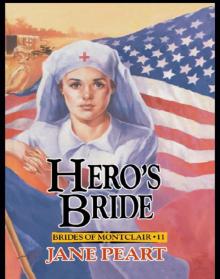 Hero's Bride
Hero's Bride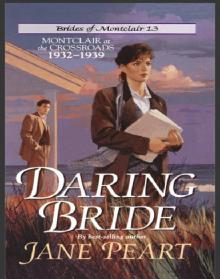 Daring Bride
Daring Bride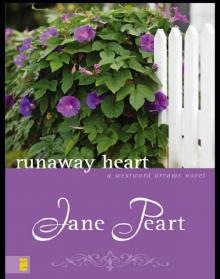 Runaway Heart
Runaway Heart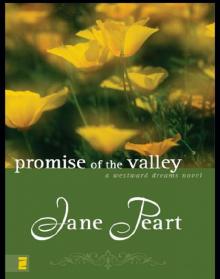 Promise of the Valley
Promise of the Valley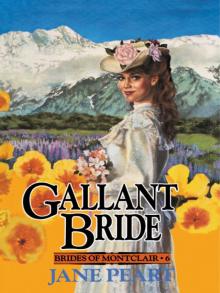 Gallant Bride
Gallant Bride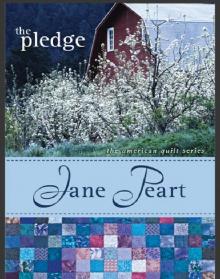 The Pledge, Value
The Pledge, Value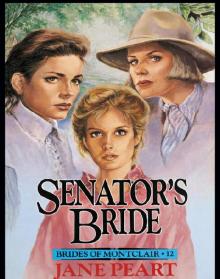 Senator's Bride
Senator's Bride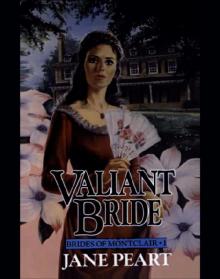 Valiant Bride
Valiant Bride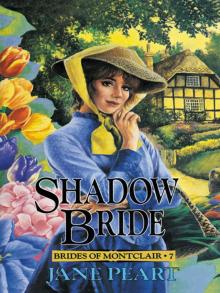 Shadow Bride
Shadow Bride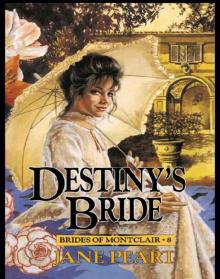 Destiny's Bride
Destiny's Bride A Tangled Web
A Tangled Web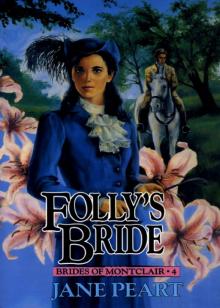 Folly's Bride
Folly's Bride The Promise
The Promise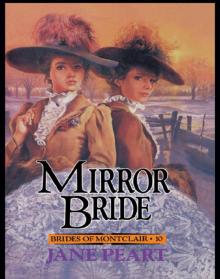 Mirror Bride
Mirror Bride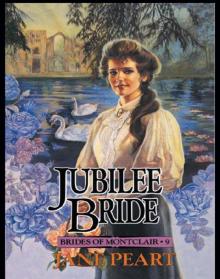 Jubilee Bride
Jubilee Bride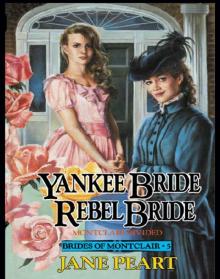 Yankee Bride / Rebel Bride
Yankee Bride / Rebel Bride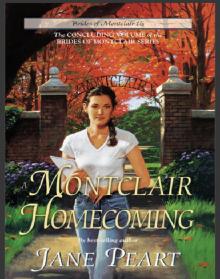 A Montclair Homecoming
A Montclair Homecoming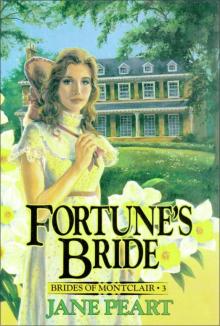 Fortune's Bride
Fortune's Bride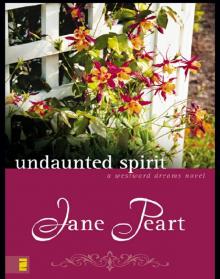 Undaunted Spirit
Undaunted Spirit Love Takes Flight
Love Takes Flight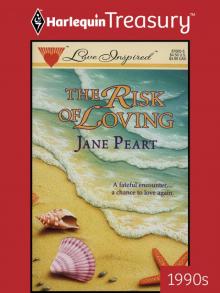 The Risk of Loving
The Risk of Loving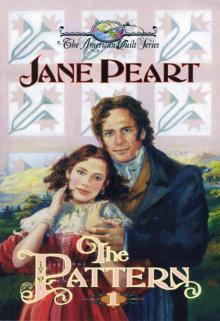 The Pattern
The Pattern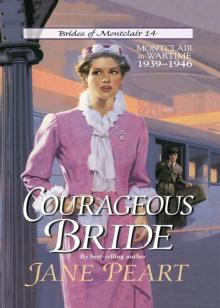 Courageous Bride
Courageous Bride